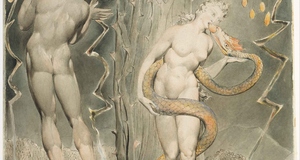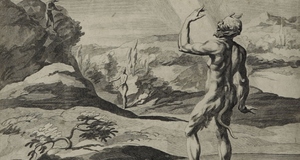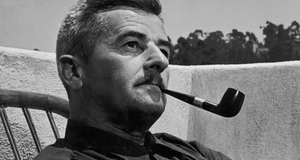Jesus Christ as The Modern Hero in John Milton's Paradise Lost
By
2010, Vol. 2 No. 02 | pg. 1/1
KEYWORDS:
The story of mankind's fall from Eden as written by John Milton in his epic poem Paradise Lost portrays a classically heroic Satan and a modern hero in God's Son, Jesus Christ. While Satan fits the archetype of an epic hero, he is in fact showing readers that classic heroes are not the true savoirs of the people. Satan is directly constrasted by God's Son, who is not a gloriously strong warrior like the antique heroes. The complex character of Satan has power beyond measure when compared to man but ultimately falls due to his very human flaw of refusing to bow down before God. The Son is not depicted as a warrior at all, but still remains as the savoir of humankind who falls. However this fall is not due to any flaw of his. His williningness to die for man is, in fact, his greatest heroic strength. The fallen Satan takes on the role of protagonist which presents him as a false hero. Even before Paradise Lost began, Satan has already undergone his rebellion against God, lost, and been banished from heaven along with his renegades. As a smaller creature compared to God, yet such a powerful creature compared to man, Satan is the most essential character to the entire story. Epic heroes such as Odysseus and Achilles were written with very similar traits: strength beyond that of normal men, natural leaders and warriors, followers who believed in them, deities remaining watchful of their actions, yet imperfect to the death. And like Satan, these heroes were the protagonists of their respected epics. This essentially lures the reader into viewing him as the character to root for. In Book I, he delivers what is in essence a rallying cry to his fellow fallen angel. He is the main character leading his men in a revolution against a system that is all powerful. While logically speaking Satan is not a character to root for, his portrayal is very human in this case. He is angry that God holds His Son in higher regard than His angels, who have done so much for him. This makes Satan easy to relate to, which makes him more likeable. On top of that, he is still the unfathomably massive being able to lead an army of fallen angels. His evil is brought to human level which enables the reader to understand him emotionally while his power is elevated to that of a hero, allowing the reader to see him as a powerful warrior capable of waging war. This deep building of the Satan character gives the illusion that he is a hero. He fits into the criteria for what the hero of an epic poem should be. But he is missing one trait to prevent him from being a true hero: sacrifice for the greater good.Satan's desires, as human as they may be, are never noble. To the human mind his intentions may seem rational and understandable, but in the realm of Paradise Lost it is only fitting to see that as the reality of the corruptible human kind. Readers may find compassion with Satan as if he were a person fighting for a cause he truly believes in as he struggles against what he considers oppression, but the actuality is that his cause is an evil one -- the corruption of mankind. God explains that Satan was made "just and right, sufficient to have stood, though free to fall" (3. 98-99), indicating that his path is not the only one available for Satan. He does not need to serve evil; he was not made that way. But he chooses that path, and with no greater noble cause to fight for, he is unable to be a true hero. Instead, his path is selfish as he chooses only to serve himself. Not once does he ask for God's redemption in order to serve Him again, nor does he try to serve God's will on Earth. Satan chooses, using his own free will, to continue down the path of bringing evil into the new perfect world that God has created for man. He makes these intentions seem heroic to his fellow devils as their discuss their next coure of action in Book II, but that face that it seems heroic to fallen angels is a telltale sign that he is not meant to be taken as a true hero. Without a noble cause, Satan is unable to be a true hero. The Son is not a classic hero, but he is made to be the most heroic character in Paradise Lost. While Satan is clearly a warrior comparable to Beowulf, God's Son is anything but. Verses are not spend informing the reader just how big the Son is, using terms that are unfathomable like those describing Satan. Instead, Milton introduces the Son and immediately depicts God warning Him of Satan's attempt to "by force... destroy, or worse, ...pervert" (3. 91-92). And while Satan looks to serve only himself, the Son shows willingness to take the ultimate sacrifice when he proclaims "I offer, on me let thine angel fall" (3. 237) and "on me let Death wreck all his rage" (3. 241). This is where the Son becomes the hero because he literally offers himself up to die. While the classic hero would fall because of a very human flaw, the Son's fall was because of mankind's flaws. He is separated from all of the classic heroes and placed above them because he did not save his people as a warrior, killing many armies, nor did he need to. The Son followed God's most noble wish, which Milton portrays as the most heroic act one could possibly do. Achilles died for his country, yet the Son died for all of mankind. Milton intentionally uses this fact to show the Son as not as epic hero, but a true savoir to humanity. While the classical epic warrior could have the strength of an army, kill many men in battle, and fight honorably for their nation, the Son did not need to kill anyone in order to die honorably for all of humanity. This is what makes him a new hero, as Milton cleverly is able to justify him breaking the mold by making his achievements so much more valuable to all of mankind than any classic hero. To put Satan and Jesus into heroic perspective, God must also be examined. In simple terms, Satan rose up against his oppressor in attempt to overthrow a government he felt was unjust. He had been forced since his creation to do as God said without question, and that feeling of servitutde drove him to rise against his tyrannical leader in order to conquer God's thrown. However, when put into context, Satan fought against the almighty being from which everything was created, including Satan's own ability to fight against Him. While the classical heroes had certain gods on their side and certain gods working against them, Paradise Lost presents just one omnipotent God. He does not have human qualities like the Greek and Roman gods did, and He is only described in human terms so that the reader can try to understand Him. He knows what is right and what is wrong; He decides it. He is not a god that can be fought against while remaining heroic because His will decides what is heroic or if any being is even able to fight against Him. In contrast to Satan's use of his free will to rise up against God, there is the Son, Jesus Christ, who chooses to be the sacrificial lamb for mankind. He may not want to, but that remains irrelevant because it is God's will that Christ dies for man - but it is still Christ's choice to do it. This separates him from any other hero in the fact that his death led to salvation, not his personal downfall. While he did die, it was not tragic given the fact that doing so freed maning from forever being damned with original sin. John Milton's Paradise Lost does put a new perspective on what an epic poem's hero can be. Although Satan could be identified as the hero, it seems evident that, according to Milton, classical heroes with similar traits as Satan should not be considered true heroes at all. In the context of Paradise Lost, heroes of that nature are just men. Like all of man, they are sinners, and their true value comes from whether they can use their God enabled free will to do something God deems positive. Christ was the ture hero of Paradise Lost, as he showed everything that Satan could not. When he was needed by God, he stepped up voluntarily and acted as an instrument of salvation for humanity. While not portrayed as a larger-than-life warrior, the character of Christ sacrifices himself to be a true hero, breaking all the traditions of what an epic hero is. ReferencesJohn, Milton,. Paradise Lost. London: Penguin, 2003. Print. Suggested Reading from Inquiries Journal
Inquiries Journal provides undergraduate and graduate students around the world a platform for the wide dissemination of academic work over a range of core disciplines. Representing the work of students from hundreds of institutions around the globe, Inquiries Journal's large database of academic articles is completely free. Learn more | Blog | Submit Latest in Literature |















